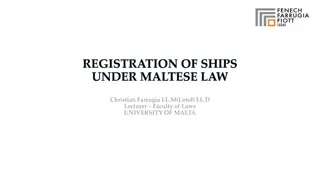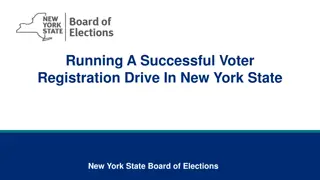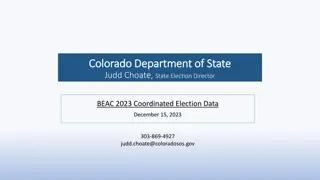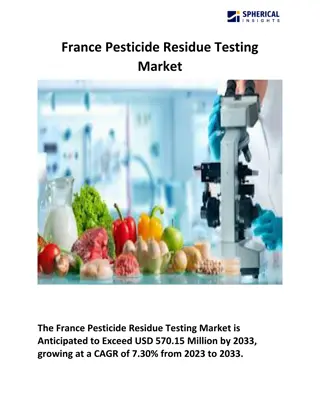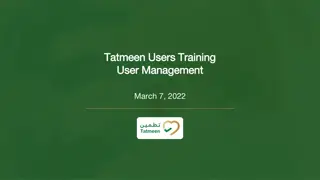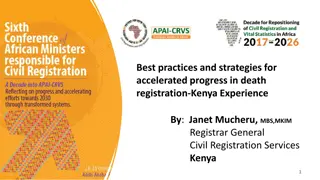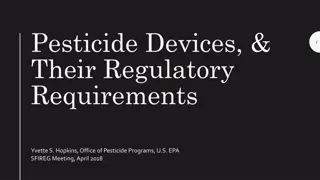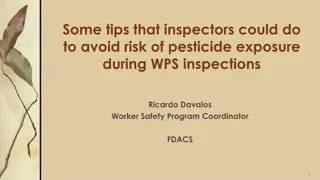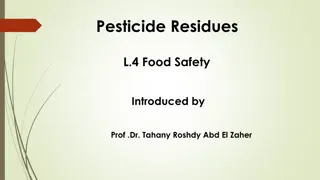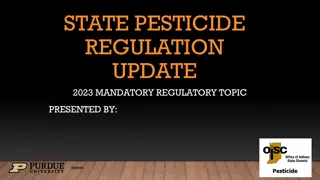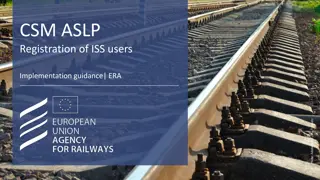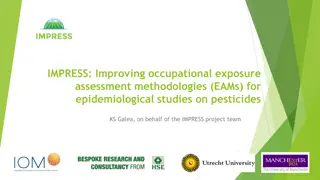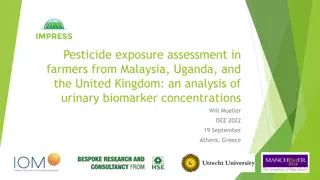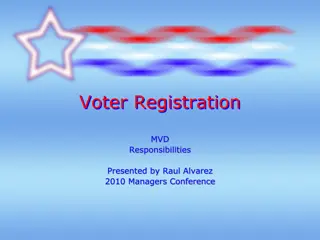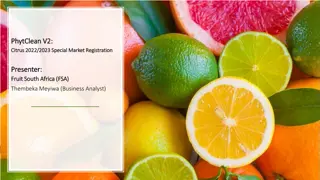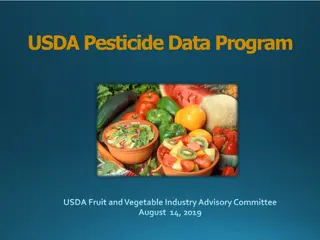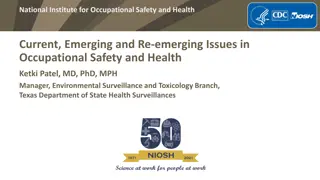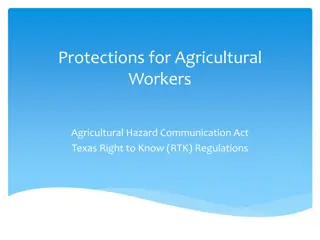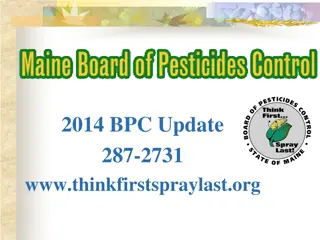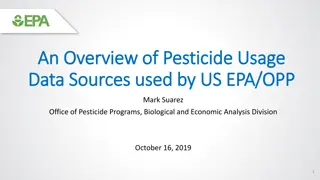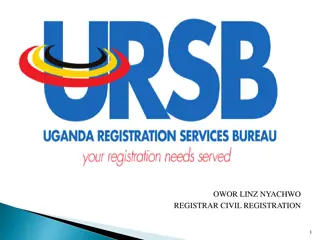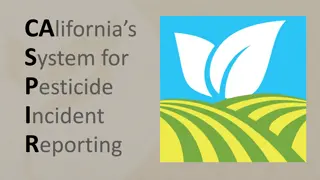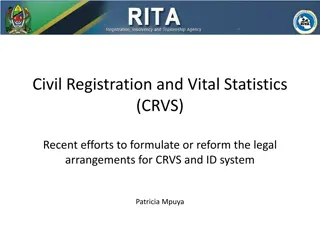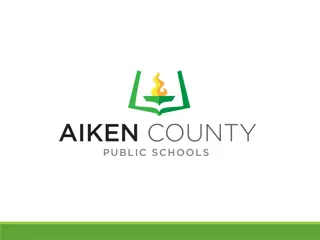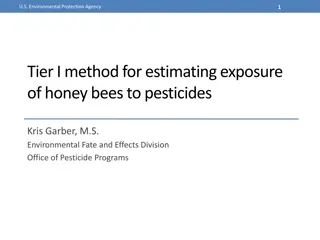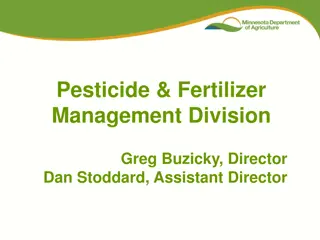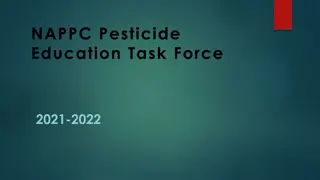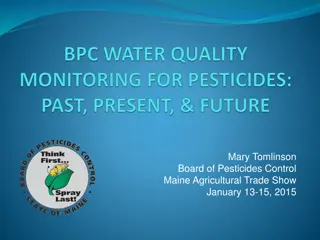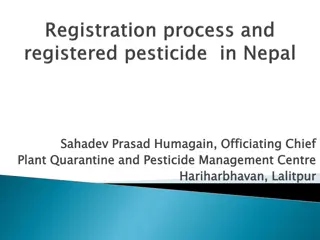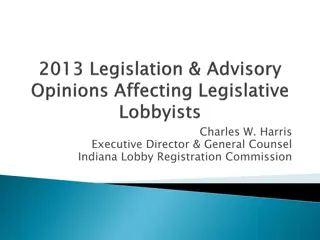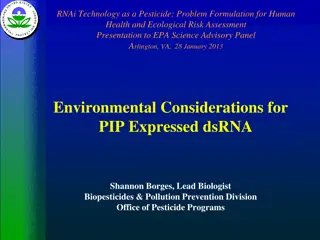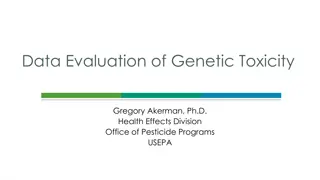Sustainable Rice Production in Pakistan: Challenges and Strategies
Pakistan's economy heavily relies on rice exports, with the country being a significant producer and exporter. However, challenges such as pesticide residues, major insect pests, and diseases threaten rice production. Key parameters for production include cultivation of improved varieties, pest mana
1 views • 42 slides
Course Registration for SPRING 2023
Attention AUCA freshmen! Online course registration for Spring 2023 is from November 21 to December 2. Make sure to complete the Anti-Harassment Training to be eligible for registration. Watch the registration tutorial and follow your department's checklist for a smooth registration process. Underst
2 views • 37 slides
REGISTRATION OF SHIPS UNDER MALTESE LAW
Explore the comprehensive process and legal framework for the registration of ships under Maltese law explained by Christian Farrugia, LL.M, LL.D. Learn about the registration of assets, ship nationality, ownership requirements, eligible vessels, and the registration process. Understand the signific
2 views • 21 slides
PM Vishwakarma Registration Process Flow
The process flow for registering applicants for PM Vishwakarma involves gathering necessary information, accessing the PM Vishwakarma portal, and completing registration via the CSC/VLEs. Applicants need to provide Aadhaar details, ration details, savings account details, and other key information t
0 views • 13 slides
SACE Presentation on Registration Requirements
The presentation by Ms. Yvonne Lechaba, Head of Registration & Teacher Professionalisation at SACE, focuses on the registration requirements for educators in South Africa according to the SACE Act. It outlines the vision, mission, and values of SACE, as well as the professional registration value ch
5 views • 13 slides
Voter Registration Process in New York State: A Comprehensive Guide
Learn how to run a successful voter registration drive in New York State with this detailed guide. Explore who qualifies to register, how New Yorkers can register online, in-person, or by mail, what is needed for registration, and the mandatory questions on the registration form. Get insights into o
1 views • 19 slides
Understanding GST Registration Essentials
Dive into the intricacies of GST registration with a focus on different types of registration, eligibility criteria, exemptions, and aggregate turnover calculations. Gain insights from expert CA Indranil Das on key topics and practical issues related to GST registration. Unravel examples, explore pe
4 views • 42 slides
Voter Registration Process in Colorado
Learn about voter registration in Colorado, including eligibility requirements, automatic voter registration process, new registration statistics, and online voter registration. Discover who is eligible to register, how automatic registration works, and the options available to voters in the state.
2 views • 35 slides
France Pesticide Residue Testing Market
The France Pesticide Residue Testing Market is Anticipated to Exceed USD 570.15 Million by 2033, growing at a CAGR of 7.30% from 2023 to 2033.\u00a0\n
0 views • 4 slides
Tatmeen Users Training - User Registration Process Overview
This document provides an overview of the user registration process for Tatmeen users, focusing on the registration of Single Point of Contact (SPOC) and non-SPOC users. It includes details on how users receive registration invitations, the different user types, steps for SPOC registration, data flo
2 views • 20 slides
Strategies for Accelerated Death Registration in Kenya: Insights from Janet Mucheru
The Civil Registration Services in Kenya faces challenges in death registration, but through lessons learned, best practices are recommended for accelerated progress. The department's core functions, purpose of civil registration, and death registration processes in Kenya are outlined, shedding ligh
3 views • 12 slides
Understanding Regulatory Requirements for Pesticide Devices
Pesticide devices, as defined by FIFRA, play a crucial role in trapping, destroying, repelling, or mitigating pests or plant and animal life. While not required to be registered with the EPA, these devices are regulated under FIFRA sections 2(q)(1), 7, and 8, with specific labeling and packaging req
0 views • 10 slides
Tips to Prevent Pesticide Exposure During WPS Inspections
Inspectors should be familiar with establishment operations, inquire about pesticide use, avoid entering treated areas without assurance, wear proper PPE, identify decontamination supplies, and practice good hygiene to minimize the risk of pesticide exposure during inspections. These precautions hel
5 views • 10 slides
Student Planning Self-Registration Guide for Term 2: Important Dates and Steps
Understand the process of self-registration using Student Planning for Term 2, access registration dates, find where to locate Student Planning in HUB, and follow essential instructions provided via email for successful registration. Learn about planning courses, schedules, electives, and registrati
0 views • 15 slides
Extraction Methods in Pesticide Residue Analysis for Food Safety
Extraction methods play a crucial role in separating pesticide residues from food matrices for analysis. Techniques involve using solvents to efficiently remove pesticides without causing chemical changes. The choice of extraction method depends on the substrate type, with liquid and solid substrate
6 views • 25 slides
State Pesticide Regulation Update 2023: Mandatory Changes and Stakeholder Involvement
The State Pesticide Regulation Update for 2023 brings significant changes including Restricted Use Pesticide applications, record-keeping requirements, and supervision of applicators. The revisions were prompted by applicator certification and training rules set by the EPA, along with public awarene
0 views • 25 slides
CSM.ASLP Registration Guidance for Implementing Users
This guidance provides detailed instructions on the registration process for users implementing the CSM.ASLP requirements. It covers the importance of registration, preparing for quality registration, entity contacts, filling out registration templates, and contacting ERA. Key points include the pur
0 views • 16 slides
Enhancing Pesticide Exposure Assessment for Epidemiological Studies
Focuses on IMPRESS project aiming to improve methodologies for assessing occupational pesticide exposure in epidemiological studies. Reviews challenges in retrospective exposure assessment, proposes methodologies, and presents key project results to date, emphasizing the use of various exposure asse
1 views • 15 slides
Pesticide Exposure Assessment in Farmers from Malaysia, Uganda, and the United Kingdom
This study evaluates the impact of pesticide exposure on farmers' health in Malaysia, Uganda, and the UK using urinary biomarker concentrations. Multiple cohorts are analyzed to assess associations between exposure-modifying factors and urine metabolite measurements. The IMPRESS project focuses on i
0 views • 12 slides
Voter Registration Responsibilities and Procedures at MVD Offices
Presented by Raul Alvarez at the 2010 Managers Conference, this information outlines the key responsibilities for Voter Registration Contacts at MVD offices. It includes details on the importance of having designated contacts, handling voter registration forms, and adhering to procedures to offer vo
0 views • 21 slides
PhytClean.V2 Citrus 2022/2023 Special Market Registration Update
This update covers the changes in the Citrus 2022/2023 Special Market Registration process using PhytClean.V2. It includes a walkthrough of the registration system, information on registration periods, costs, available markets, dashboard features, and document requirements. Seasonal registration rem
0 views • 9 slides
Enhancing Pesticide Spray Effectiveness with Adjuvants for Rosarians
Adjuvants play a crucial role in improving the efficacy of pesticide applications for rosarians. They aid in maximizing the impact of pesticides by enhancing their application process. Various types of adjuvants, such as surfactants, extenders, and penetrants, serve different purposes like adjusting
0 views • 11 slides
USDA Pesticide Data Program Overview
The USDA Pesticide Data Program (PDP) provides high-quality pesticide residue data for US foods to support regulatory decision-making and ensure food safety. Through cooperative agreements with participating states, the program conducts sampling of various commodities, including fresh fruits and veg
0 views • 17 slides
Occupational Pesticide Safety and Health Concerns
Occupational safety and health issues related to pesticide exposure are a significant concern globally. Limited surveillance data on pesticide exposure and related illnesses are available, with a high percentage of farmers being affected annually. Various occupations beyond farming also face potenti
1 views • 25 slides
Agricultural Workers' Protections under Right-to-Know Regulations
Agricultural workers in Texas have rights under the Agricultural Hazard Communication Act, also known as Right-to-Know (RTK) Law. This Act ensures that agricultural workers receive essential information regarding pesticide exposure, workplace chemicals, and their entitlement to health and safety det
0 views • 15 slides
Important Updates in Pesticide Regulations and Program Changes
New pesticide regulations and program changes are introduced, including requirements for obtaining a pesticide applicator license, major proposed changes to the Worker Protection Standard (WPS) by the EPA, introduction of new inspectors, and the phaseout of Endosulfan. Special Maine registrations fo
0 views • 66 slides
Understanding Pesticide Data Collection and Analysis
Pesticide data usage is crucial for accurate assessments and prioritization of areas with high likelihood of usage. Various sources, quality requirements, and data considerations are highlighted, emphasizing the importance of incorporating usage data for informed decision-making.
0 views • 12 slides
Civil Registration System in Uganda: Legal Framework and Responsibilities
The civil registration system in Uganda is governed by a legal framework including the Constitution, Registration Services Bureau Act, Children Act, and other laws. The Uganda Registration Services Bureau oversees the registration of vital events such as births, deaths, marriages, and adoptions. Reg
0 views • 23 slides
Essential Facilities in a Bio-Pesticide Laboratory for Smart Agriculture
Establishing a bio-pesticide laboratory is vital for research, development, and mass production of bio-pesticides. Key rooms include sterilization, media preparation, inoculation, growth chamber, mixing, insect rearing, and washing rooms. The sterilization room houses equipment like autoclave and ho
0 views • 10 slides
California's System for Pesticide Incident Reporting Overview
Explore California's CASPIR system for reporting pesticide incidents, designed to enhance communication between counties, DPR, and fieldworker groups. The system's timeline, purpose, and key features, including incident report submission, intelligent case routing, mobile app functionality, and admin
0 views • 33 slides
Reform Efforts in Civil Registration and Vital Statistics System in Tanzania
The Registration Insolvency and Trusteeship Agency (RITA) in Tanzania is responsible for vital event registration, insolvency services, and trusteeship services. The history of birth registration in Tanzania dates back to the colonial era, with separate systems for Mainland Tanzania and Zanzibar. La
0 views • 9 slides
Streamlining Registration and Enrollment Process Overview
This detailed guide provides essential information on registration and enrollment procedures, emphasizing the importance of training multiple personnel at each school. Key topics covered include new student registration, returning student registration, Parent Portal access, system differences betwee
0 views • 21 slides
U.S. EPA Tier I Method for Bee Pesticide Exposure Estimation
Tier I assessment by the U.S. Environmental Protection Agency focuses on generating conservative estimates of pesticide exposures to honey bees. The goal is to differentiate pesticides that pose risks to bees from those needing further evaluation. The process involves considering food consumption ra
0 views • 53 slides
Pesticide & Fertilizer Management Division Overview
The Pesticide & Fertilizer Management Division is a key state agency in Minnesota responsible for regulating pesticides and fertilizers, protecting groundwater, responding to emergencies, managing spills, and promoting agricultural water quality. The division works with farmers, industry stakeholder
0 views • 11 slides
NAPPC Pesticide Education Task Force 2021-2022 Summary
The NAPPC Pesticide Education Task Force for 2021-2022 aims to utilize pesticide registration and regulation as tools to safeguard and enhance pollinator health. The task force focuses on educating various audiences, including pesticide applicators, farmers, homeowners, educators, and state departme
0 views • 15 slides
Exploring Pesticide Monitoring and Contamination Studies in Maine
Mary Tomlinson's work with the Maine Board of Pesticides Control includes past studies on groundwater and surface water monitoring, ongoing monitoring initiatives, and future collaborative studies. The State Law mandates residue surveys to identify possible contamination sources and develop a pestic
1 views • 55 slides
Procedures and Management of Pesticide Registration in Nepal
This content provides detailed information on the registration procedures, management, and regulation of pesticides in Nepal. It covers the registration method, advantages of analogous registration, banned pesticides list, types of pesticides, and essential documentation requirements for pesticide r
0 views • 43 slides
Amendments and Changes in Lobbyist Registration Requirements
Amendments to the definition of legislative persons, inclusion of certain individuals and organizations in the definition, changes in registration fees, and shifts in the registration year timeline for lobbyists in Indiana starting from July 1, 2013. The process for filing annual registration statem
1 views • 24 slides
Understanding Environmental Risks of RNAi Technology as a Pesticide
This presentation discusses the environmental considerations and risk assessments associated with RNAi technology as a pesticide, focusing on the unique challenges presented by dsRNA PIPs. Topics covered include ecological risk assessments, nontarget organism exposure, exposure assessments for PIP p
0 views • 13 slides
Evaluation of Genetic Toxicity in Pesticide Programs - Data Overview
The presentation by Dr. Gregory Akerman discusses the evaluation of genetic toxicity, focusing on genotoxicity data for glyphosate, including gene mutation, chromosomal abnormality, and primary DNA damage. It explores the consequences of genotoxicity, such as cancer risks and cell death, along with
0 views • 27 slides


